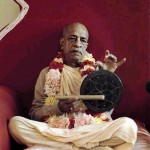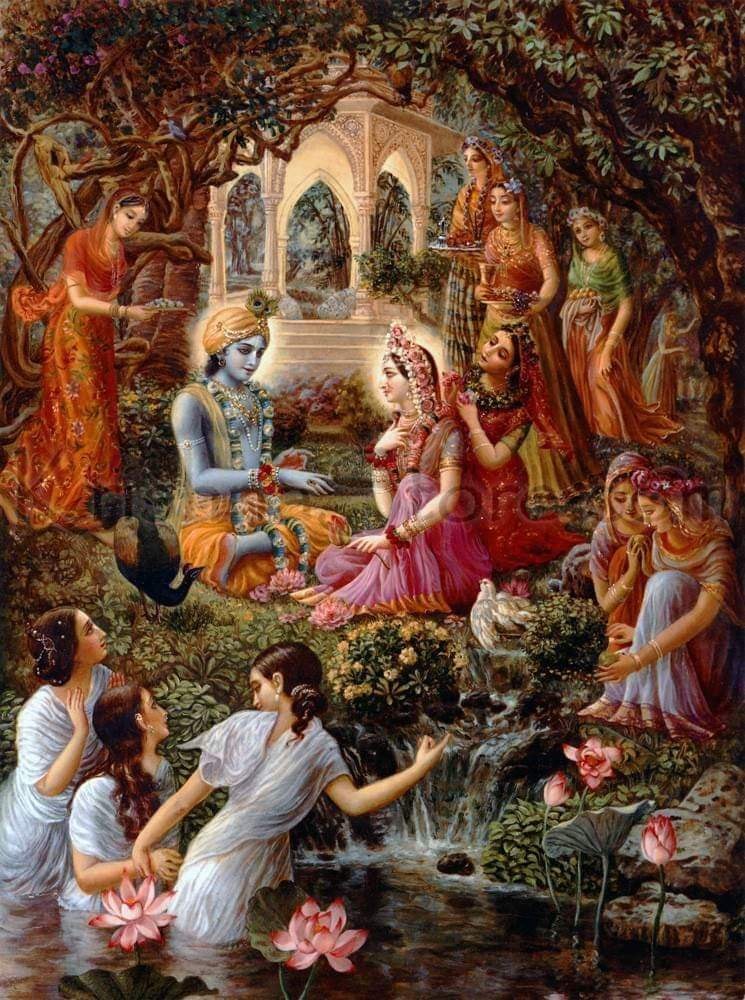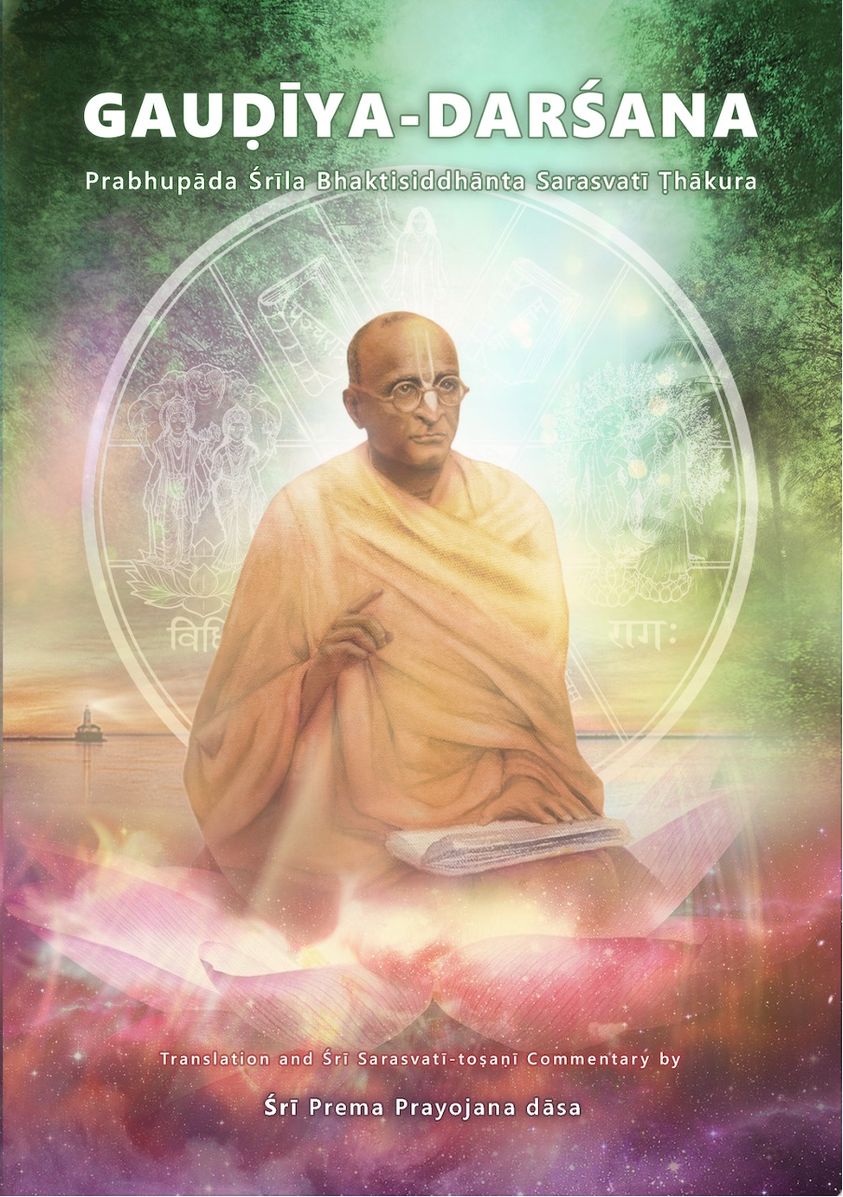Renunciation of Action
From Srila Bhaktivedanta Swami Prabhupadas Bhagavad Gita Chapter 5 Texts 17 -21

Srila Bhaktivedanta Swami Prabhupada
TEXT 17
TRANSLATION
When one's intelligence, mind, faith and refuge are all fixed in the Supreme, then one becomes fully cleansed of misgivings through complete knowledge and thus proceeds straight on the path of liberation
PURPORT
The Supreme Transcendental Truth is Lord Krsna. The whole Bhagavad-gītā centers around the declaration of Kṛṣṇa as the Supreme Personality of Godhead. That is the version of all Vedic literature. Paratattva means the Supreme Reality, who is understood by the knowers of the Supreme as Brahman, Paramātmā and Bhagavān. Bhagavān, or the Supreme Personality of Godhead, is the last word in the Absolute. There is nothing more than that.TheLord says, matta paratara nānyat kishcit asti dhanashjaya. Impersonal Brahman is also supported by Krsna: brahmaṇo pratisthāham. Therefore in all ways Krishna is the Supreme Reality. One whose mind, intelligence, faith and refuge are always in Krishna , or, in other words, one who is fully in Krishna consciousness, is undoubtedly washed clean of all misgivings and is in perfect knowledge in everything concerning transcendence. A Krishna conscious person can thoroughly understand that there is duality (simultaneous identity and individuality) in Krsna, and, equipped with such transcendental knowledge, one can make steady progress on the path of liberation.
TEXT 18
TRANSLATION
The humble sage, by virtue of true knowledge, sees with equal vision a learned and gentle brāhmana, a cow, an elephant, a dog and a dog-eater [outcaste]
PURPORT
A Krsna conscious person does not make any distinction between species or castes. The brāhmaṇa and the outcaste may be different from the social point of view, or a dog, a cow, or an elephant may be different from the point of view of species, but these differences of body are meaningless from the viewpoint of a learned transcendentalist. This is due to their relationship to the Supreme, for the Supreme Lord, by His plenary portion as Paramātmā, is present in everyone's heart. Such an understanding of the Supreme is real knowledge. As far as the bodies are concerned in different castes or different species of life, the Lord is equally kind to everyone because He treats every living being as a friend yet maintains Himself as Paramātmā regardless of the circumstances of the living entities. The Lord as Paramātmā is present both in the outcaste and in the brāhmana, although the body of a brāhmaṇa and that of an outcaste are not the same. The bodies are material productions of different modes of material nature, but the soul and the Supersoul within the body are of the same spiritual quality. The similarity in the quality of the soul and the Supersoul, however, does not make them equal in quantity, for the individual soul is present only in that particular body, whereas the Paramātmā is present in each and every body. A Krsna conscious person has full knowledge of this, and therefore he is truly learned and has equal vision. The similar characteristics of the soul and Supersoul are that they are both conscious, eternal and blissful. But the difference is that the individual soul is conscious within the limited jurisdiction of the body, whereas the Supersoul is conscious of all bodies. The Supersoul is present in all bodies without distinction
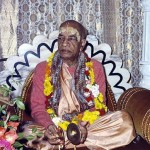
Text 19
TRANSLATION
Those whose minds are established in sameness and equanimity have already conquered the conditions of birth and death. They are flawless like Brahman, and thus they are already situated in Brahman.
PURPORT
Equanimity of mind, as mentioned above, is the sign of self-realization. Those who have actually attained to such a stage should be considered to have conquered material conditions, specifically birth and death. As long as one identifies with this body, he is considered a conditioned soul, but as soon as he is elevated to the stage of equanimity through realization of self, he is liberated from conditional life. In other words, he is no longer subject to take birth in the material world but can enter into the spiritual sky after his death. The Lord is flawless because He is without attraction or hatred. Similarly, when a living entity is without attraction or hatred, he also becomes flawless and eligible to enter into the spiritual sky. Such persons are to be considered already liberated, and their symptoms are described below.
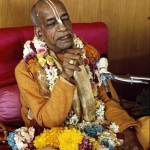
Text 20
TRANSLATION
A person who neither rejoices upon achieving something pleasant nor laments upon obtaining something unpleasant, who is self-intelligent, unbewildered, and who knows the science of God, is to be understood as already situated in Transcendence.
PURPORT
The symptoms of the self-realized person are given herein. The first symptom is that he is not illusioned by the false identification of the body with his true self. He knows perfectly well that he is not this body, but is the fragmental port~on of the Supreme Personality of Godhead. He is therefore not joyful in achieving something, nor does he lament in losing anything which is related to his body. This steadiness of mind is called sthira-buddhi, or self-intelligence. He is therefore never bewildered by mistaking the gross body for the soul, nor does he accept the body as permanent and disregard the existence of the soul. This knowledge elevates him to the station of knowing the complete science of the Absolute Truth, namely Brahman, Paramātmā and Bhagavān. He thus knows his constitutional position perfectly well, without falsely trying to become one with the Supreme in all respects. This is called Brahman , or self-realization. Such steady consciousness is called a Krishna consciousness

Text 21
TRANSLATION
Such a liberated person is not attracted to material sense pleasure or external objects but is always in trance, enjoying the pleasure within. In this way the self-realized person enjoys unlimited happiness, for he concentrates on the Supreme
PURPORT
Śrī Yāmunācārya, a great devotee in Krishna consciousness, said:
yadāvadhi mama cetaḥ -padāravind
nava-nava-rasa-dhāmanudyata rantum āsīt
tadāvadhi bata nārī-saṅgame smaryamāne
bhavati mukha-vikāraḥ suṣṭu niṣṭhīvanaṁ ca
"Since I have been engaged in the transcendental loving service of Kṛṣṇa, realizing ever-new pleasure in Him, whenever I think of sex pleasure, I spit at the thought, and my lips curl with distaste." A person in brahma-yoga, or Kṛṣṇa consciousness, is so absorbed in the loving service of the Lord that he loses his taste for material sense pleasure altogether. The highest pleasure in terms of matter is sex pleasure. The whole world is moving under its spell, and a materialist cannot work at all without this motivation. But a person engaged in a Krishna consciousness can work with greater vigor without sex pleasure, which he avoids. That is the test in spiritual realization. Spiritual realization and sex pleasure go ill together. A conscious person is not attracted to any kind of sense pleasure due to his being a liberated soul.


